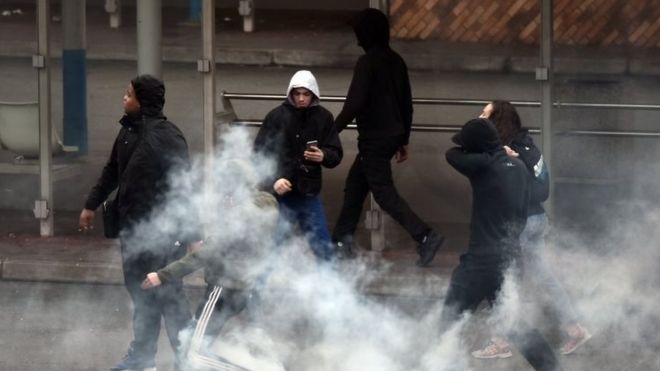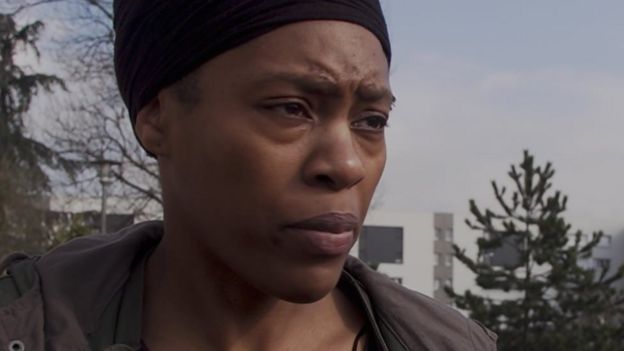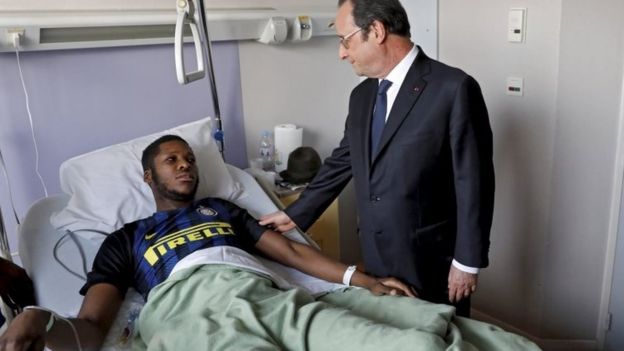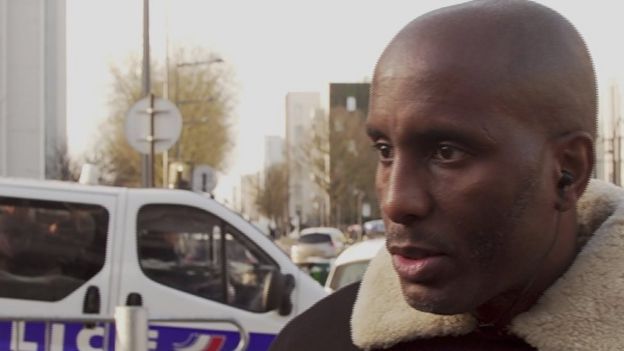http://www.bbc.com/news/world-europe-39011298

In the Paris suburbs, youth sits idle. Young men chat and smoke. Some deal drugs. Most days are spent like this.
But today the talk is still about the alleged sexual assault on one of their friends, 22-year-old Theo, a young black man, who was brutalised by police.
A truncheon, they say, was rammed into his backside, leaving him hospitalised for two weeks.

I meet his sister Eleanor, behind the graffiti-covered building where the assault is said to have taken place.
"They pulled him around the side to make sure the cameras couldn't see it," she says.
"Everyone here knows where the CCTV cameras are, and he tried to get to a place where they could see him. But the police - there were four of them - they pulled him back.
"I was afraid. I was afraid to see how he is and what they had done."
Eleanor says she was in disbelief when she heard the details of what had happened. Her elder brother told her it was rape.
"'Rape?' I said. 'What are you talking about?'
"I started to cry because I was so shocked. But after that I knew I had to be strong."
Attacks by police, residents here say, are pretty common.
But this provoked real anger. Protests erupted across the French capital - cars were burned and property destroyed.

Mejdi is 27 and was born on the estate. He rides up and down on his BMX, but is keen to stop and talk.
"If there is no charge for rape," he warns, "people here will go mad."
"Nothing changes here. I was here in 2005 during the massive protests - they came back and tried to clean the place up. But you don't change anything with a coat of paint. Work, hope. We have none of that."
He - like many here - is bright and well informed. He knows what the problems are - but is despondent that no-one seems to want to solve them.
An air of boredom and hopelessness hangs over this place.
For the young men here, the state is the enemy.
Police cars drive up and down the roads, through column after column of social housing. Groups of young men shout "rapists" as they go by.

Local activist Franco, from the anti-negrophobia league, says the anger is justified.
"The expression of their anger is the consequence of this first violence against Theo. This violence is a system, and this keeps us in a place where we cannot progress.
"When there is no justice, we have to fight to have it."
Theo's ordeal is part of a bigger cycle of violence that keeps on spinning. Youth vs police; black vs white; haves vs have nots. And communities left behind.
Fabien is also from the anti-negrophobia group.
"What the police are trying to do right now is not protecting us," he says.
"They want us to just shut up. They don't want us to express in any shape or form. They are just here to shut us down.
"We have to come and ask for justice. We have to acknowledge that this injustice is particular to a certain type of people. Coloured, minority, black, Arab - whatever you want. We are the most exposed to the systemic racism of the French state."
Theo himself appealed for calm from his hospital bed. His sister is also keen to stress her commitment to peace.
"We speak because we trust in justice," she says. But she knows what's in store if that justice isn't seen to be done.
"If not, there will be more anger, for sure," Eleanor says.

In the Paris suburbs, youth sits idle. Young men chat and smoke. Some deal drugs. Most days are spent like this.
But today the talk is still about the alleged sexual assault on one of their friends, 22-year-old Theo, a young black man, who was brutalised by police.
A truncheon, they say, was rammed into his backside, leaving him hospitalised for two weeks.

I meet his sister Eleanor, behind the graffiti-covered building where the assault is said to have taken place.
"They pulled him around the side to make sure the cameras couldn't see it," she says.
"Everyone here knows where the CCTV cameras are, and he tried to get to a place where they could see him. But the police - there were four of them - they pulled him back.
"I was afraid. I was afraid to see how he is and what they had done."
Eleanor says she was in disbelief when she heard the details of what had happened. Her elder brother told her it was rape.
"'Rape?' I said. 'What are you talking about?'
"I started to cry because I was so shocked. But after that I knew I had to be strong."
Attacks by police, residents here say, are pretty common.
But this provoked real anger. Protests erupted across the French capital - cars were burned and property destroyed.

Mejdi is 27 and was born on the estate. He rides up and down on his BMX, but is keen to stop and talk.
"If there is no charge for rape," he warns, "people here will go mad."
"Nothing changes here. I was here in 2005 during the massive protests - they came back and tried to clean the place up. But you don't change anything with a coat of paint. Work, hope. We have none of that."
He - like many here - is bright and well informed. He knows what the problems are - but is despondent that no-one seems to want to solve them.
An air of boredom and hopelessness hangs over this place.
For the young men here, the state is the enemy.
Police cars drive up and down the roads, through column after column of social housing. Groups of young men shout "rapists" as they go by.

Local activist Franco, from the anti-negrophobia league, says the anger is justified.
"The expression of their anger is the consequence of this first violence against Theo. This violence is a system, and this keeps us in a place where we cannot progress.
"When there is no justice, we have to fight to have it."
Theo's ordeal is part of a bigger cycle of violence that keeps on spinning. Youth vs police; black vs white; haves vs have nots. And communities left behind.
Fabien is also from the anti-negrophobia group.
"What the police are trying to do right now is not protecting us," he says.
"They want us to just shut up. They don't want us to express in any shape or form. They are just here to shut us down.
"We have to come and ask for justice. We have to acknowledge that this injustice is particular to a certain type of people. Coloured, minority, black, Arab - whatever you want. We are the most exposed to the systemic racism of the French state."
Theo himself appealed for calm from his hospital bed. His sister is also keen to stress her commitment to peace.
"We speak because we trust in justice," she says. But she knows what's in store if that justice isn't seen to be done.
"If not, there will be more anger, for sure," Eleanor says.

